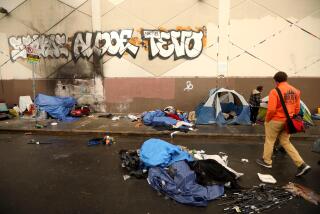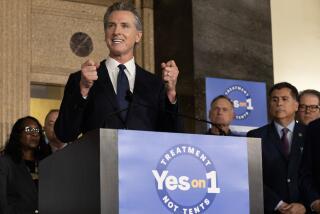Newsletter: Did, as Gov. Gavin Newsom suggests, Texas make San Francisco’s homelessness crisis worse?
Facing what feels like the first real crisis of his new administration — and in the midst of stalled efforts in Sacramento to do something about it — Gov. Gavin Newsom has taken aim at something new when asked about California’s homelessness problem: Texas.
Specifically, Newsom accused the Republican-led state of sending people to San Francisco.
“The vast majority also come in from — and we know this — from Texas. Just interesting fact,” Newsom said in an interview broadcast on Sunday with “Axios on HBO.”
The comment came after interviewer Jim VandeHei asked Newsom why the net size of San Francisco’s homeless population hadn’t changed much during his tenure as the city’s mayor (although a number of people did find shelter during his administration).
“The vast majority were not from California,” the governor said of those who were still left on the city’s streets. “I’m not suggesting they’re not our responsibility. Quite the contrary, we took responsibility.”
Sign up for the Essential Politics newsletter »
In some ways, the comment was little more than another jab in the longstanding slugfest between the Golden State and the Lone Star State. Chronicled last week by the Economist in a series of special reports, the feud is equal doses practical and political. Both states have sought to crown themselves as champions in economic might. And both California and Texas won national attention by challenging the agendas of the last two presidents.
But back to the accusation: Where did Newsom’s data come from?
A spokesman first pointed to a 2016 newspaper story that counted the number of homeless people San Francisco officials put on buses to other communities and states. But the article doesn’t cite any inbound deliveries of people. In fact, it reported that Texas was the top out-of-state destination for San Francisco to send away homeless people. As of late Sunday night, there was no additional information provided to back up the governor’s claim.
Newsom conceded in the broadcast that California has an enormous poverty problem. “We’ve got to get our act together,” he said. Nonetheless, he went on to criticize states led by Republicans that he said have an “intentional” policy to ignore those in need.
“We could cut all those programs, let those folks suffer for themselves,” the governor said. “You lose a little bit of your soul. Where’s the strength in that? That’s weakness.”
NEWSOM ON TRUMP AND HIS VOTERS
Newsom also used the TV interview to lash out sharply at what he said was a lack of caring by President Trump about the rural, white voters whose support helped propel him to victory in 2016.
“I have deep respect for these people. I just don’t want them to be lied to,” he said, insisting he had spent much of his life in the rural California foothills, where his late father lived. “You think Trump cares about them? He’s a sole practitioner.”
And then, there was this: “They’re getting a completely raw deal. They’ve been sold a complete bill of ... , excuse my language.”
BUT BACK TO CALIFORNIA’S HOMELESSNESS CRISIS
Newsom faces what might be the most consequential week of his five-and-a-half months in office, as there remains no agreement on the state spending close to $1 billion on homelessness and housing assistance.
And time feels as though it’s running short. The governor must sign the blueprint of a new state budget by Thursday, and California’s new fiscal year begins next Monday. Almost every other major policy struggle has ended. Legislators have ratified a plan to align some business taxes with federal law and use the resulting new revenues to raise the state’s tax credit for the working poor to almost $1 billion. They’ve approved a new tax on phone services to pay for 911 emergency services. They’ve approved budget plans on education spending and a new contract for prison guards.
But there’s still disagreement over how to divvy up the homelessness funds — with some groups balking over giving a lump sum to various counties to spend as they see fit. Nor is there any clarity about whether the state will seek to impose some kind of sanctions on local governments that fall short of building enough housing.
Bottom line: Watch what comes out of Sacramento this week. This is a big test for Newsom’s negotiating skills.
NATIONAL LIGHTNING ROUND
-- Trump, who says he made an eleventh-hour decision last week to call off a retaliatory military strike against Iran, declared in an interview aired Sunday that he was open to talks without preconditions.
-- Black voters will play a key role in choosing Democrats’ 2020 nominee, and South Carolina will present candidates an important early test of their strength in the African American community.
-- A South Bend, Ind. town hall featuring Mayor Pete Buttigieg broke into near chaos Sunday afternoon as the Democratic presidential candidate tried to respond to community anger over a white police officer’s killing of a black man.
-- The first Democratic debate this week gives members of the party’s huge presidential field a chance to attract badly needed attention. For some, though, it could be a final opportunity. And then there are those demons left from the 2016 campaign.
-- The Trump administration on Saturday unveiled a $50-billion Palestinian investment and infrastructure proposal intended to be the economic engine to power its still unreleased “deal of the century” Middle East peace plan.
TODAY’S ESSENTIALS
-- The California budget Newsom will sign into law includes hundreds of millions of dollars in new programs that could simply disappear in two years.
-- George Skelton’s take on the fiscal plan: “Nothing spectacular. Nothing horrible. But OK.”
-- The Assembly Health Committee passed a controversial bill last week to tighten vaccine medical exemptions, despite hundreds of parents who opposed it.
-- Citing years of voter confusion, a California lawmaker’s change to state election law would force the state’s American Independent Party to change its name. (Here’s our 2016 investigation on this same issue.)
-- California is poised to charge the highest taxes and fees on gas in the country when an increase kicks in July 1, but officials say the state is still billions of dollars short of what’s needed to properly fix the roads.
-- To reduce wildfires and save utilities, Newsom wants $10.5 billion from ratepayers.
-- Three-quarters of Californians want limits on new housing in wildfire areas, according to a UC Berkeley Institute of Governmental Studies poll conducted for The Times.
-- A Southern California regional government agency is pushing back against the state’s efforts to get local governments to set aside more land for housing.
-- Newsom and California lawmakers will get pay raises, but their long tenure as the highest-paid state officials in the country will end soon.
LOGISTICS
Essential Politics is written by Sacramento bureau chief John Myers on Mondays and Washington bureau chief David Lauter on Fridays.
There will be no newsletter on Monday, July 1.
You can keep up with breaking news on our politics page throughout the day. And are you following us on Twitter at @latimespolitics?
Miss Friday’s newsletter? Here you go.
Please send thoughts, concerns and news tips to politics@latimes.com.
Did someone forward you this? Sign up here to get Essential Politics in your inbox.
More to Read
Get the L.A. Times Politics newsletter
Deeply reported insights into legislation, politics and policy from Sacramento, Washington and beyond. In your inbox three times per week.
You may occasionally receive promotional content from the Los Angeles Times.







